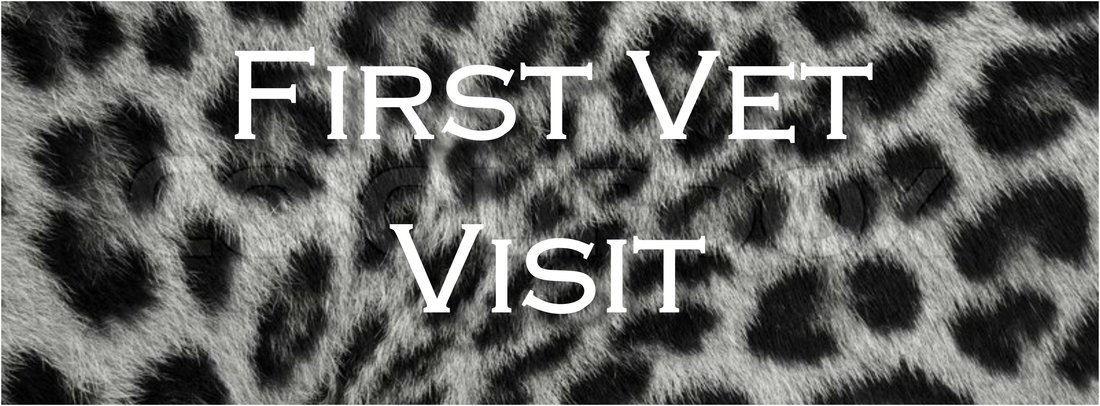- Welcome to Jewelspride Bengals
- SHOP
- Jewelspride Designs
- Life is Better With Bengals - Blog Articles
-
KITTENS
- Links
- SHOP
- Bengal Care - Everything You Need to Know
- About Us
- Catios and Cat Posts!
- Cat Boarding!
- ** Queens **
- ** Studs **
- Our Cattery and Visits
- Cat Wheels
- **NEW** Jewelspride Alumni
- Photo Gallery & Videos
- Uno's World
- Contact Us
- *New! Cat TV!*
- New Page
- Custom Gifts by Carmen
Be Prepared For Your First Visit to the Vet |
YOUR KITTEN'S VACCINATION & OTHER VET CARE HISTORY
As noted in the take home pamphlet you were given when you picked up your kitten, your kitten has received two sets of modified live vaccinations while he was here with us (once at 8 weeks and again at 12 weeks): Rhinotracheitis, Calicivirus, and Panleukopenia.
At the 12 week appointment your kitten was also dewormed with Profender, implanted with his mircrochip, and spayed or neutered.
Ever since your kitten's 2nd week birthday he has been given a preventative deworming (Strongid-T) every two weeks. After 8 weeks of age he was given a monthly preventative flea treatment (Advantage).
As noted in the take home pamphlet you were given when you picked up your kitten, your kitten has received two sets of modified live vaccinations while he was here with us (once at 8 weeks and again at 12 weeks): Rhinotracheitis, Calicivirus, and Panleukopenia.
At the 12 week appointment your kitten was also dewormed with Profender, implanted with his mircrochip, and spayed or neutered.
Ever since your kitten's 2nd week birthday he has been given a preventative deworming (Strongid-T) every two weeks. After 8 weeks of age he was given a monthly preventative flea treatment (Advantage).
CONGENITAL ISSUES
We regularly health test all of our adult breeding cats for several potential health issues. This begins with testing our breeding cats for PK Def, PRA-b and HCM. A negative test result in the first two tests ensures your kitten is also negative for these issues. HCM (congenital heart disease) testing, however is merely a picture in time of the heart. This test must be repeated every year or two to ensure a normal healthy heart. HCM may develop at any stage of a cat's life - the testing is performed regularly in order to track our cats' health and ensure we are breeding only the healthiest cats and producing the healthiest kittens possible.
It is important to note that HCM and a heart murmur are not one and the same thing. Sometimes a cat with a heart murmur will test positive for HCM, however often a kitten with a heart murmur will not develop HCM. Should your kitten present with a kitten heart murmur (innocent or otherwise) at his health exam while he is with us, it will be noted in his vet booklet as soon as we are made aware of it and you will be given the option to proceed with the adoption, or forego your kitten in favour of a subsequent choice of kitten from a future litter. In most cases a kitten heart murmur will be harmless and may even disappear within the first 6 months of your kitten's life. Should the murmur persist however, your vet may suggest moving on to additional investigative procedures such as an echo-cardiogram. This will tell the vet if the murmur is anything that may require medication or if it is just something to keep an eye on. Our aim is complete disclosure and if you have any questions at all about your kitten or his health, please ask us. We are happy to answer any questions you may have - if we don't have the answers, we will consult with our veterinarian and provide you with answers.
We regularly health test all of our adult breeding cats for several potential health issues. This begins with testing our breeding cats for PK Def, PRA-b and HCM. A negative test result in the first two tests ensures your kitten is also negative for these issues. HCM (congenital heart disease) testing, however is merely a picture in time of the heart. This test must be repeated every year or two to ensure a normal healthy heart. HCM may develop at any stage of a cat's life - the testing is performed regularly in order to track our cats' health and ensure we are breeding only the healthiest cats and producing the healthiest kittens possible.
It is important to note that HCM and a heart murmur are not one and the same thing. Sometimes a cat with a heart murmur will test positive for HCM, however often a kitten with a heart murmur will not develop HCM. Should your kitten present with a kitten heart murmur (innocent or otherwise) at his health exam while he is with us, it will be noted in his vet booklet as soon as we are made aware of it and you will be given the option to proceed with the adoption, or forego your kitten in favour of a subsequent choice of kitten from a future litter. In most cases a kitten heart murmur will be harmless and may even disappear within the first 6 months of your kitten's life. Should the murmur persist however, your vet may suggest moving on to additional investigative procedures such as an echo-cardiogram. This will tell the vet if the murmur is anything that may require medication or if it is just something to keep an eye on. Our aim is complete disclosure and if you have any questions at all about your kitten or his health, please ask us. We are happy to answer any questions you may have - if we don't have the answers, we will consult with our veterinarian and provide you with answers.
FEEDING
We have found that a common topic of discussion during the first week of kitten ownership is raw feeding. More often than not, at your kitten's first visit to see your vet (unless you have been lucky enough to find a wholistic vet on board with a natural, species appropriate raw diet) your vet will present you with several arguments against raw feeding. We may or may not have already warned you about this during one of your visits to our cattery. In any case, it can be alarming, and it may be effective at scaring you away from feeding your kitten what he has always eaten and what nature has intended him to eat in order to grow and thrive for the remainder of his life. He is a cat. Cats need to eat raw meat. It's as simple as that. If that is not enough back up for you when you are presented with your vet's arguments against raw feeding, we have put together some help for you here.
We have found that a common topic of discussion during the first week of kitten ownership is raw feeding. More often than not, at your kitten's first visit to see your vet (unless you have been lucky enough to find a wholistic vet on board with a natural, species appropriate raw diet) your vet will present you with several arguments against raw feeding. We may or may not have already warned you about this during one of your visits to our cattery. In any case, it can be alarming, and it may be effective at scaring you away from feeding your kitten what he has always eaten and what nature has intended him to eat in order to grow and thrive for the remainder of his life. He is a cat. Cats need to eat raw meat. It's as simple as that. If that is not enough back up for you when you are presented with your vet's arguments against raw feeding, we have put together some help for you here.

"My vet doesn't agree with feeding a raw diet... how do I address this?" Here is some helpful information you can provide for your vet when discussing diet options for your new kitten or cat: "Cat Nutrition" and "Open Letter to Veterinarians".
Please take a moment to watch this video - this vet is one of my favourite vets when it comes to someone with knowledge of the benefits of a raw diet for your obligate carnivore cat.
Another excellent article written by a vet explaining why a raw diet for your bengal is best:
Feeding Your Cat: Know the Basics of Feline Nutrition, by Lisa A. Pierson, DVM
Feeding Your Cat: Know the Basics of Feline Nutrition, by Lisa A. Pierson, DVM
If you have any questions at all about anything that may come up before or at your initial vet visit, please let us know. We will do our best to find all the answers and assist you in any way we can!
Copyright © 2024 Jewelspride Cattery and Carmen Klassen
- Welcome to Jewelspride Bengals
- SHOP
- Jewelspride Designs
- Life is Better With Bengals - Blog Articles
-
KITTENS
- Links
- SHOP
- Bengal Care - Everything You Need to Know
- About Us
- Catios and Cat Posts!
- Cat Boarding!
- ** Queens **
- ** Studs **
- Our Cattery and Visits
- Cat Wheels
- **NEW** Jewelspride Alumni
- Photo Gallery & Videos
- Uno's World
- Contact Us
- *New! Cat TV!*
- New Page
- Custom Gifts by Carmen






